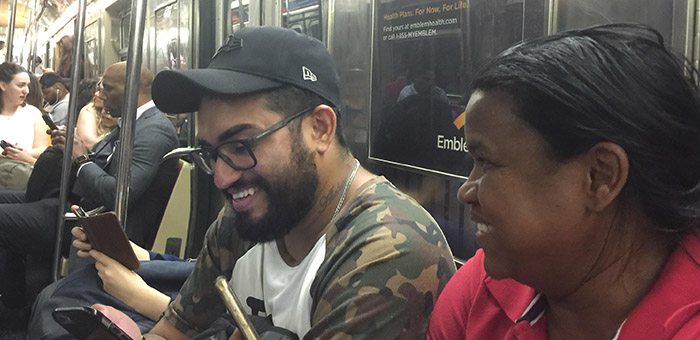Coletivo Papo Reto: Combating Police Violence in Brazil
Last week, WITNESS was joined in our Brooklyn headquarters by some of our most inspiring partners, Raull Santiago and Renata Trajano of Coletivo Papo Reto. Papo Reto is a group of community-based activists who use cell phones and social media to counter mainstream narratives, document abuses, and report police violence in the Complexo do Alemão, a group of 16 favelas in the northern part of Rio de Janeiro, Brazil.
WITNESS’ partnership with Coletivo Papo Reto began in 2014. Upon learning that communities on the frontlines of police violence in Brazil were embracing the potential of video and social media to speak out—and at great personal risk—WITNESS’ Latin America team offered resources surrounding safety and security. In collaboration with WITNESS’ representatives in Brazil (Senior Program Manager Priscila Neri and Brazil Program Coordinator Victor Ribeiro), Papo Reto also pulls together teams of allies including activists, public defenders, and lawyers, to critically consider how to use visual documentation for advocacy, protection, and evidence.
At our weekly staff meeting, WITNESS staff, partners, and allies gathered to hear Papo Reto co-founders Raull and Renata speak about life in Complexo do Alemão, as well the collective’s process, challenges, and accomplishments fighting impunity in the favelas. The media is littered with stories depicting Raull and Renata’s community as one plagued by drug trafficking and violence, reinforcing a mainstream narrative that fails to account for the full experience of those who live in the community. Raull described the “war on drugs” and legal systems as racist tools of containment and control over poor communities in Brazil. As an example, he invoked the case of Eduardo de Jesus, a ten-year-old boy who was fatally shot in the head in 2015 by a police officer who supposedly mistook his phone for a gun as he played on his front stoop.
In the aftermath of Eduardo’s murder, Papo Reto was the first on the scene and quickly began filming and taking photographs to preserve critical evidence. Papo Reto’s presence and cameras prevented the police from tampering with the crime scene, a common tactic used to mask extrajudicial killings. Their involvement also initiated a forensic analysis of the scene, something Raull remembered as “the first forensic analysis of a killing in a favela that I’ve ever seen in my 28 years of living in Complexo do Alemão.”
Without Papo Reto’s visual documentation, certain victories would not have been possible: the preservation of the evidence and an in-depth investigation (rare), as well as the ultimate conclusion that Eduardo was indeed killed by police fire (even rarer). However, the officer was never brought to justice in the courts of law. Eduardo’s story speaks to the paradigm of police activity in Rio; officers are rarely held accountable for their actions, and the statistics citing frequency are shocking.
“In Brazil,” Renata informed the room, “one young black person is killed every 11 minutes.”*
“And the reality in Brazil is that a person is killed several times,” Raull explained. “First, they are killed by the actual bullet. Then, they are killed by the media narrative, which parrots the police version of events by describing that person as criminals and assassinating their reputation. And finally, they are killed by the legal systems that fail to hold perpetrators accountable.”
In the event of extrajudicial deaths like Eduardo’s, or the ongoing illegal invasions of private residences in Complexo do Alemão, Papo Reto both receives and produces documentation of violence, and uses it to publicly demonstrate the impact of these violations on the residents—with the ultimate goal of creating accountability and change. For the collective, mobile phones are “weapons of defense and protection.” Members burn through phones rapidly, filming continuously and tirelessly to capture the truth, often amassing a series of explicit and clear videos that can be used as evidence.
This summer, Papo Reto celebrated an important victory, when a collection of video footage was used as evidence in court to indict two high-level commanders for their responsibility in the unlawful invasion of private homes. This case is a significant success, considering the widespread impunity for abuses committed by police in favelas.
In contrast with the mainstream narrative of his community, Raull describes Complexo do Alemão as “a place with a lot of power and amazing ideas—a space of resistance for poor and black families,” who fight every day to combat the larger, very intentional, systems that seek to profit from the lives of marginalized residents. Raull and Renata are also quick to clarify that for them, “it’s not a choice to be an activist.” The violence faced by residents of Complexo do Alemão is a reality, and the documentation of that violence is a matter of daily survival.
“I am most scared of giving up and not fighting for a better tomorrow,” Renata explained, a sentiment that Raull echoed with resounding confidence: “I just need to know that you are with me, and for you to know that I am with you. I believe in that.”
Our session concluded with Renata asking all in attendance to please share the following message: “Stop killing our youth – the extermination of black youth in Brazil needs to end.”
Follow Coletivo Papo Reto on Facebook, Twitter, and Instagram.
*Officially, police were responsible for 920 killings in 2016 in the city of Rio de Janeiro alone, and post–Olympics, that number continues to rise; the number of police killings was 78% higher in the first two months of 2017 compared to the same period of 2016. However, as is also true in the United States, statistics tend to be unreliable. Reporting of extrajudicial killings by police end up masked as “deaths by resistance,” with terms like “stray bullets” used to deflect accountability. Activists believe that the actual number of people killed by police in Brazil is as high as four or five times the official count; in 2014, the BBC reported that the Brazilian police kill six people each day.
Featured image: Raull and Renata on the subway in New York City, September 2017.

